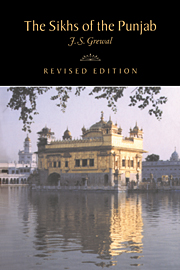Book contents
- Frontmatter
- Introduction
- 1 The Turko-Afghan Rule
- 2 Foundation of the Sikh Panth
- 3 Evolution of the Sikh Panth (1539–1606)
- 4 Transformation of the Sikh Panth (1606–1708)
- 5 Rise to political power (1708–1799)
- 6 The Sikh empire (1799–1849)
- 7 Recession and resurgence (1849–1919)
- 8 In the struggle for freedom (1920–1947)
- 9 Towards the ‘Punjabi Province’ (1947–1966)
- 10 In the new Punjab state (1966–1984)
- Bibliographical essay
- Index
- THE NEW CAMBRIDGE HISTORY OF INDIA
- Frontmatter
- Introduction
- 1 The Turko-Afghan Rule
- 2 Foundation of the Sikh Panth
- 3 Evolution of the Sikh Panth (1539–1606)
- 4 Transformation of the Sikh Panth (1606–1708)
- 5 Rise to political power (1708–1799)
- 6 The Sikh empire (1799–1849)
- 7 Recession and resurgence (1849–1919)
- 8 In the struggle for freedom (1920–1947)
- 9 Towards the ‘Punjabi Province’ (1947–1966)
- 10 In the new Punjab state (1966–1984)
- Bibliographical essay
- Index
- THE NEW CAMBRIDGE HISTORY OF INDIA
Summary
This essay is by no means exhaustive. It is meant to serve as a guide to some of the best material on Sikh history, but the omission of a work is no reflection on its character. What is included is sufficiently representative of historical writing and major categories of source materials on the subject. The essay is divided into five parts. The first four cover the four distinct periods of Sikh history mentioned in the Preface. The last contains a few general observations.
After the classic work of Joseph Davey Cunningham, A History of the Sikhs (London, 1849), Gokal Chand Narang picked up the threads more than six decades later in his Transformation of Sikhism (4th edn, New Delhi, 1956) to be followed by J. C. Archer, The Sikhs in Relation to Hindus, Moslems, Christians and Ahmadiyas: A Study in Comparative Religion (Princeton, 1946); Teja Singh and Ganda Singh, A Short History of the Sikhs (Bombay, 1950); Indubhusan Banerjee, Evolution of the Khalsa (2nd edn, Calcutta, 1962); and Khushwant Singh, A History of the Sikhs (Oxford, 1963). More analytical than these general histories is Niharranjan Ray's The Sikh Gurus and Sikh Society: A Study in Social Analysis (Patiala, 1970). W. Owen Cole attempts to place the Sikh movement in a broad context in Sikhism and its Indian Context 1469-1708 (New Delhi, 1984). For ideas and institutions, the trail was blazed by Teja Singh in Sikhism: Its Ideals and Institutions (Bombay, 1937), to be followed much later by W. H. McLeod, The Evolution of the Sikh Community (Oxford, 1975). A few critical essays on the period by J.S. Grewal, From Guru Nanak to Maharaja Ranjit Singh (2nd edn, Amritsar, 1982) provide some new insights.
- Type
- Chapter
- Information
- The Sikhs of the Punjab , pp. 259 - 267Publisher: Cambridge University PressPrint publication year: 1991

